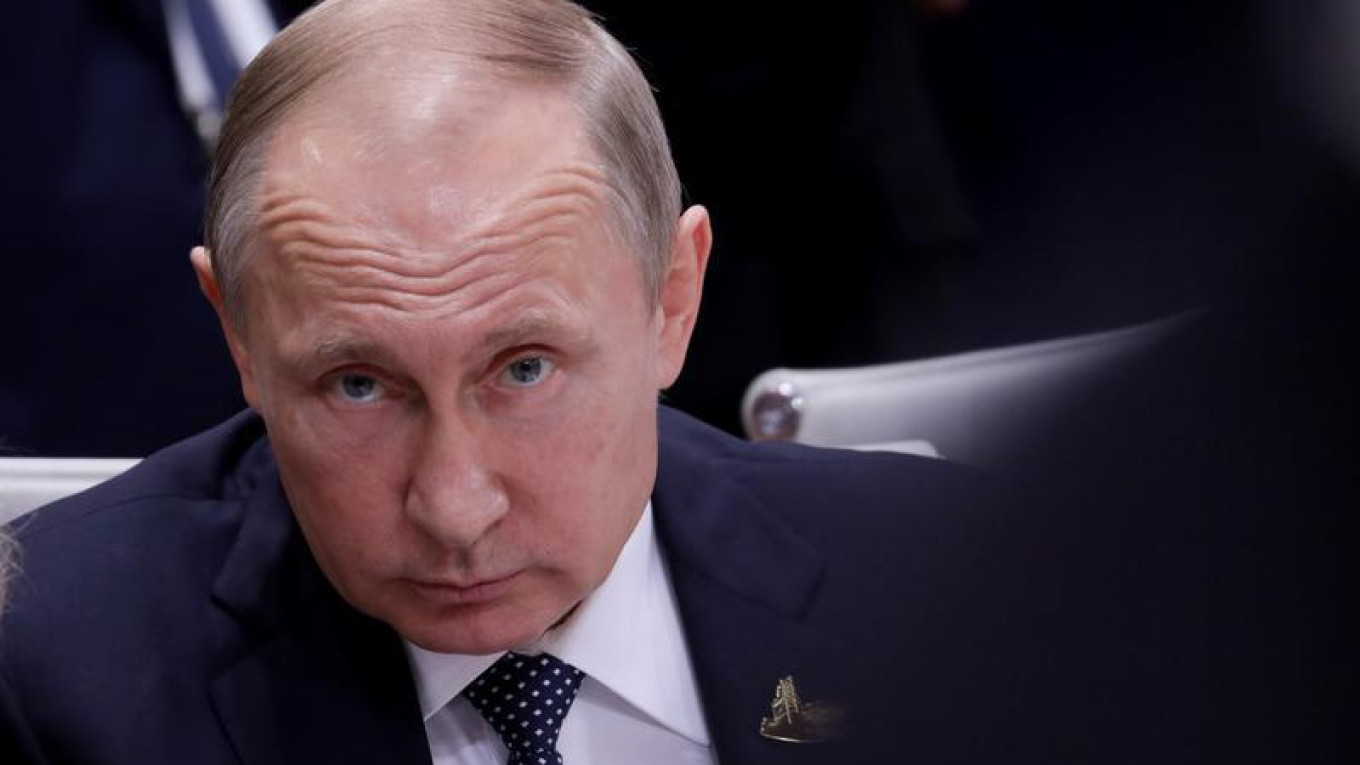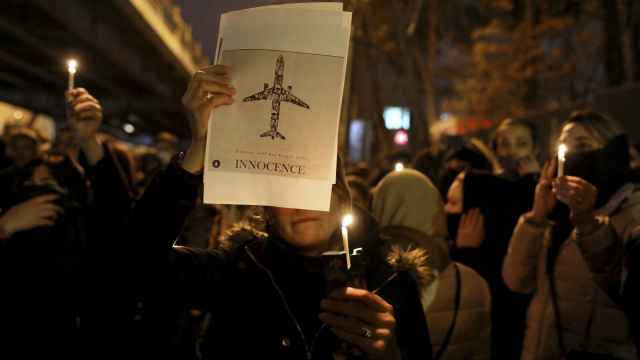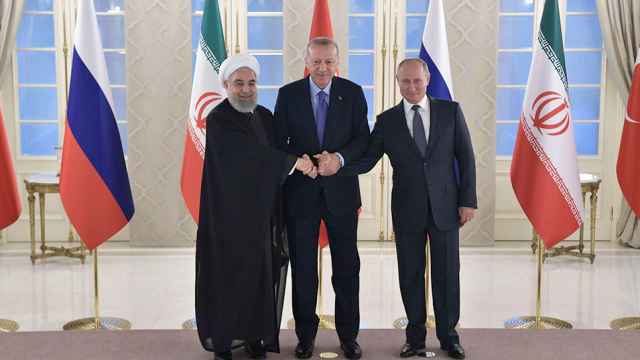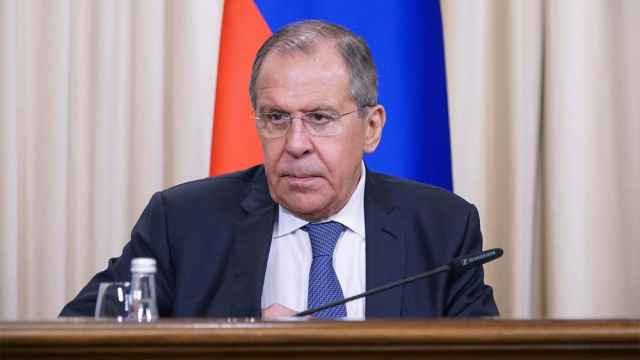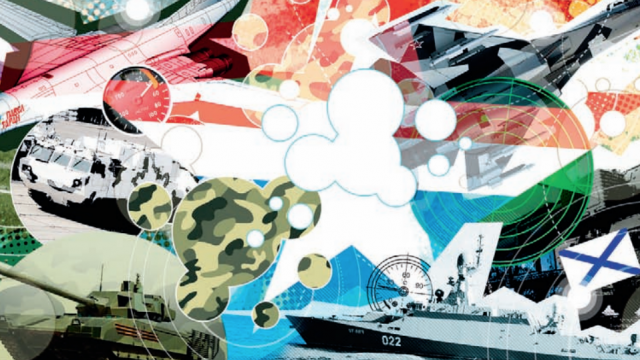During the 2014 Ukraine crisis, Russia broke from the post–Cold War system and openly challenged U.S. dominance. This effectively ended 25 years of cooperation between great powers and ushered in an era of intense competition. Three years on, Moscow is still in defiance.
Moscow’s immediate foreign policy goal is to withstand the pressure imposed on it by Washington and its allies. Having adjusted its economy to sanctions and low oil prices, Russia continues to seek ways to reduce its political isolation, and has moved from defense to offense in the information space.
Since February 2014, President Vladimir Putin has been acting as a wartime leader. So far, the Kremlin has been holding firm, giving no ground to its opponents.
Russia has been disappointed in its hopes that the Trump administration would take a more understanding approach to Moscow. It has also been surprised by the early defeat in the French presidential elections of its favorite candidate, Francois Fillon.
Donald Trump’s tougher approach to Russia, the consensus within the German political establishment that the West should continue to pressure Russia, and pro-EU, pro-Atlanticist Emmanuel Macron’s victory in France have minimized the chances that either the United States or Europe might ease its attitudes toward Moscow in the next four to five years.
The Kremlin has no intention of stepping back or reconciling itself with the West through concessions and promises of improved behavior. In the words of Foreign Minister Sergei Lavrov, appeasement of the West at the expense of Russian national interests is over.
On the contrary, Russia’s operation in Syria, which began in the fall of 2015, poses a fresh challenge to the U.S.-dominated order. Moscow has broken a post–Cold War U.S. monopoly on the global use of force and has staged a spectacular geopolitical comeback in a region it had abandoned in the waning years of the Soviet Union.
Russia’s principal foreign policy priorities, based on its actions in Ukraine and Syria, are checking any advance of NATO in Eastern Europe and confirming Russia’s status as a great power beyond the post-Soviet space.
Moscow’s strategy is to coerce its former partners turned rivals — the United States above all — to acknowledge Russia’s security interests and accept its importance as a power to be reckoned with globally.
Moscow’s engagement with the West on issues such as Ukraine, Syria, or Iranian and North Korean nuclear matters is geared to these priorities.
With the Minsk II agreement of February 2015, Moscow aims to create an insurmountable constitutional obstacle in Ukraine to Kiev’s accession to NATO and insert a pro-Russian element into the Ukrainian body politic.
By means of an eventual peace settlement in Syria, Russia wants to get U.S. recognition of its equal status, regain the role of a major outside power in the region, and keep Syria as its geopolitical and military stronghold.
Russia’s willingness to engage Europe on Ukraine and its offer of a coalition against Islamic State* in Syria are linked to Moscow’s hopes progressively easing EU-imposed sanctions and restoring a modicum of economic relations with Western Europe.
Russia also hoped that developments in the European Union, including Brexit and elections in France, would lead to a less Atlanticist, less Russoskeptic EU. These hopes have also been disappointed.
Russia’s rupture with the West has increased the importance of the country’s non-Western partners. Bolstering ties with China and keeping the relationship friendly are major priorities. Forging an alliance with Beijing, in which Moscow would be the junior partner, is not.
Moscow’s relations with India, Brazil, and South Africa, cordial as they are, have not expanded much, due mainly to Russia’s economic weakness. The fall of oil prices has led to the contraction of Russian exports by about a third. Expansion of Russian arms sales has not compensated for this shortfall.
Russia’s intervention in Syria has brought Moscow into a situational alliance with Iran, and has led to close and not always friendly interaction with Turkey.
Rhetorically, furthering Eurasian economic integration is among Moscow’s major priorities. In reality, the economic crisis that has affected all of post-Soviet Eurasia, has put the Eurasian Economic Union (EEU) on the back burner. Keeping close bilateral relations with the key partner countries Belarus and Kazakhstan, however, will be a priority—even as both Minsk and Astana demonstrate their independence from Moscow.
On the other hand, conquering the Baltic states or establishing pro-Russian enclaves there are not on Russia’s foreign policy to-do list. Neither is taking Ukraine by force. Even integrating Ukraine’s Donbass region controlled by anti-Maidan separatists would be a major problem for Russia, economically and legally.
Having entered information warfare with the Western mainstream media in the wake of the Ukraine crisis, Russia has massively stepped up its activities, both domestically and internationally.
Internationally, Russian propaganda seeks to highlight and exploit its adversaries’ problems and conflicts, undermining the confidence of Western peoples in democracy and U.S. leadership.
Arguably, Russian activism does not stop there. It has become actively engaged in the Western political debate, including during election campaigns. In the presidential elections of 2016 in the United States and 2017 in France, Moscow made its preferences fully known. This trend is likely to continue, widening the battleground between Russia and the West.
It has been widely reported that Russia’s political activism in the West also has a covert dimension. But evidence of this is understandably patchy and unreliable. Given publicly available information, it is difficult to conclude that Russia was able to manipulate U.S. elections and impose its choice on the American people.
It is also safe to assume that the West itself is hardly passive. To Putin, Western sanctions have had an unintended upside in restricting Russian officials’ exposure to the West and Western governments’ capacity to influence and pressure them.
But it is clear that top Russians have many more dealings with the West that could, at least in theory, be exploited against the Kremlin. This makes the Kremlin far more vulnerable to this sort of exploitation than the other way around.
Russia also has opposition politicians like Mikhail Khodorkovsky and others and Western media streaming into Russian living rooms.
In the run-up to Russia’s presidential elections in March 2018, information activities will multiply, but they will not cease there.
Though Putin likely enters his fourth formal, and fifth actual, presidential term in 2018, the post-Putin future will loom larger with every passing year. The stakes for all involved, both in Russia and the West, will be very high.
*Islamic State is a terrorist organization banned in Russia.
Dmitry Trenin is director of Carnegie Moscow Center where an unabridged version of this piece was originally published.
The views and opinions expressed in opinion pieces do not necessarily reflect the position of The Moscow Times.
A Message from The Moscow Times:
Dear readers,
We are facing unprecedented challenges. Russia's Prosecutor General's Office has designated The Moscow Times as an "undesirable" organization, criminalizing our work and putting our staff at risk of prosecution. This follows our earlier unjust labeling as a "foreign agent."
These actions are direct attempts to silence independent journalism in Russia. The authorities claim our work "discredits the decisions of the Russian leadership." We see things differently: we strive to provide accurate, unbiased reporting on Russia.
We, the journalists of The Moscow Times, refuse to be silenced. But to continue our work, we need your help.
Your support, no matter how small, makes a world of difference. If you can, please support us monthly starting from just $2. It's quick to set up, and every contribution makes a significant impact.
By supporting The Moscow Times, you're defending open, independent journalism in the face of repression. Thank you for standing with us.
Remind me later.



